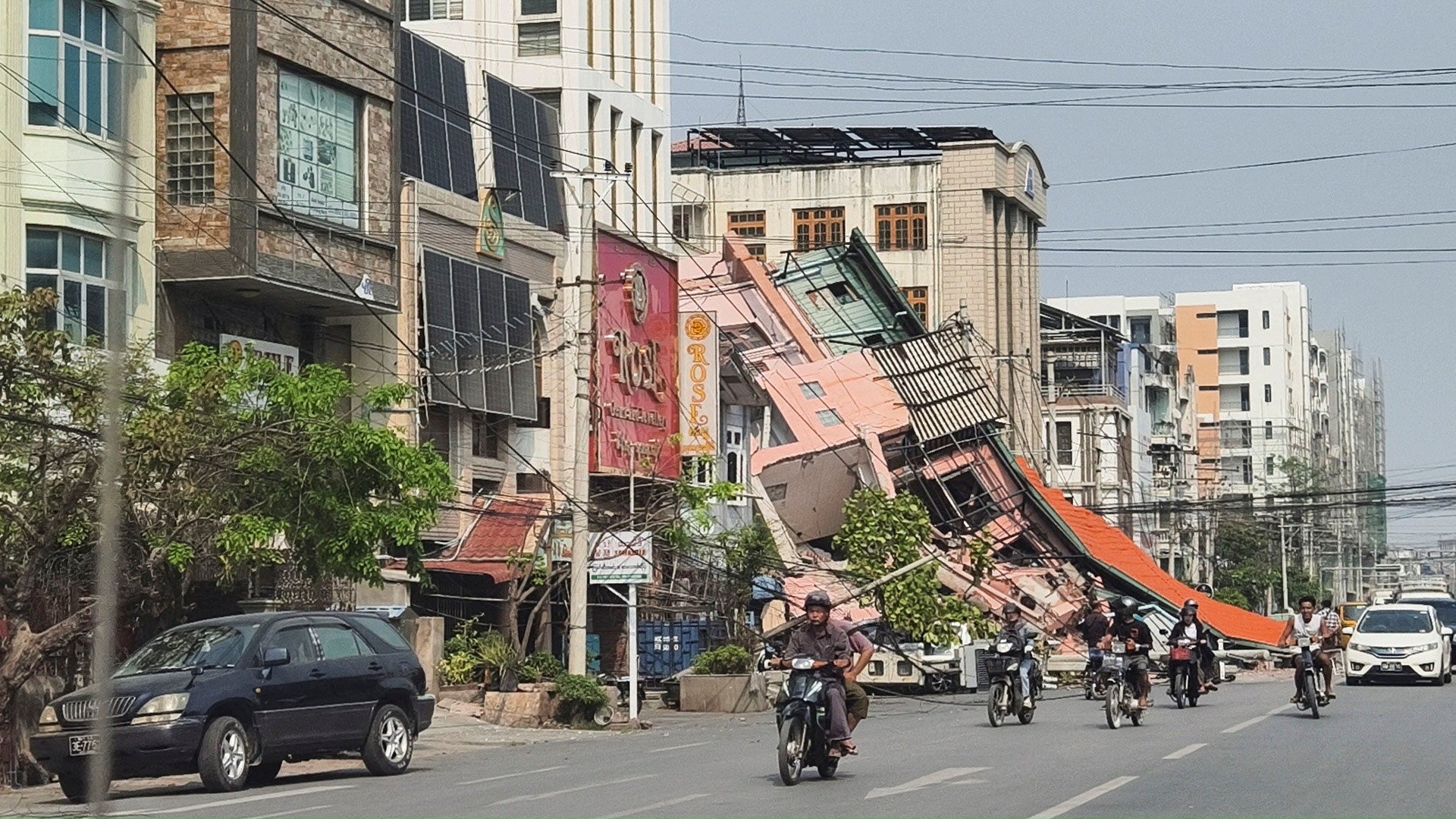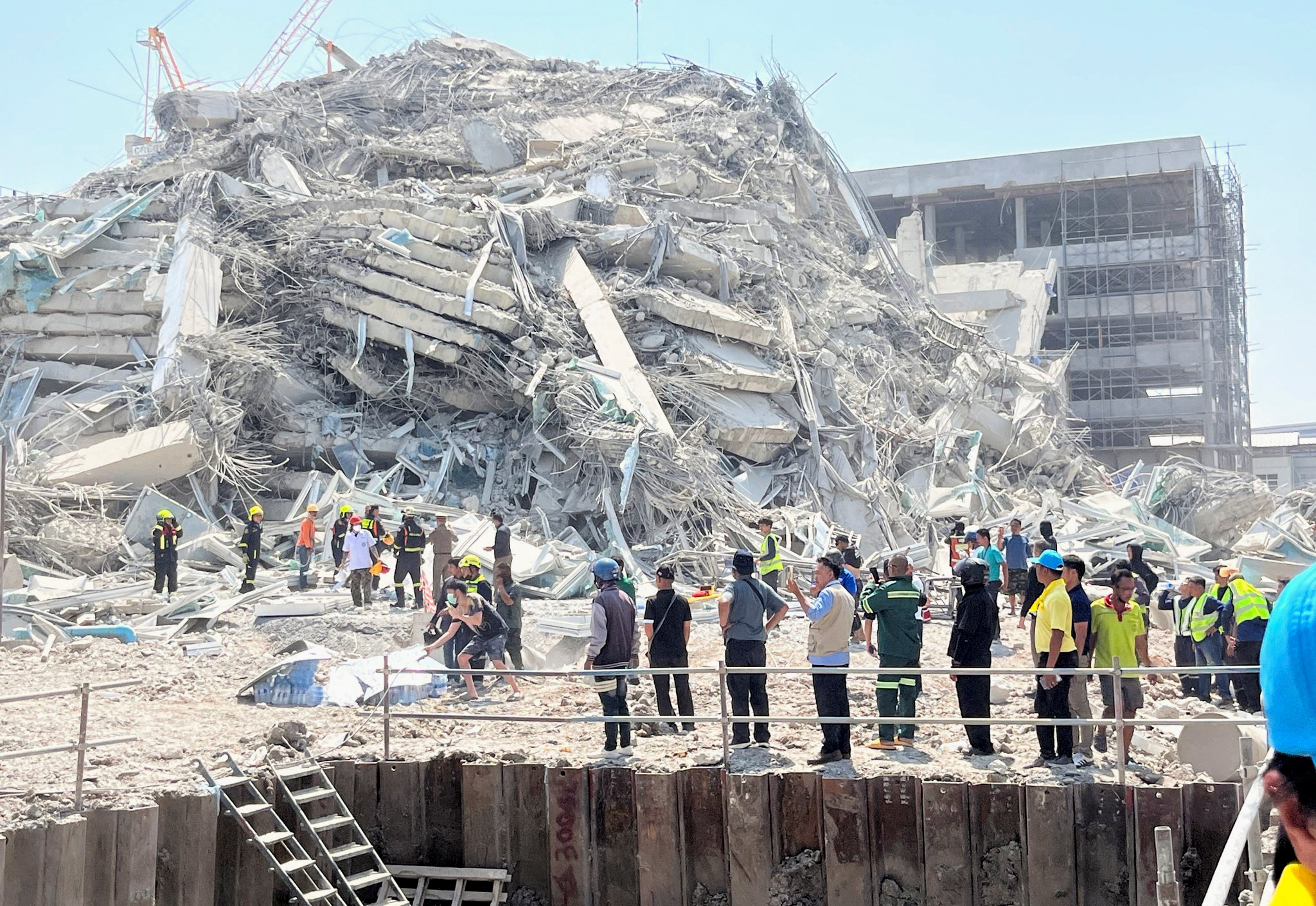Why the earthquake could help hasten the fall of Myanmar’s brutal dictator
Annabel Venning’s family lived in Myanmar for many years before it was ruled by a repressive military regime. Denied democracy and devastated by natural disaster, its suffering people are in their greatest hour of need and deserve our help
A group of Buddhist monks in saffron robes are gathered beside a shrine lying collapsed on the ground but seemingly intact, as if someone has pushed it over. They are not looking at this but at a mid-rise, primrose-yellow building a few hundred yards away.
As the monks film on their phones – the building, seemingly solid one moment, suddenly collapses into itself, the upper storeys disappearing in a cloud of dust as the monks flinch, crouch and then quickly resume filming again. One can only hope that everyone inside had already got out.
Meanwhile, the top of the spire of Shwe Sar Yan pagoda near Mandalay, near the epicentre of the earthquake, snaps off as onlookers scream and weep at the demise of this thousand-year-old pagoda. In Mandalay, the exquisite royal palace, built in the 1850s, has suffered damage too.
Buildings across the country, from apartment blocks in cities to bamboo homes in refugee camps, have collapsed, with thousands of casualties likely trapped inside. It could not come at a worse time for Myanmar with the repressive military regime engaged in a brutal war against the population. Since the coup in 2021, five million people have been forced to flee their homes, and at least 6,000 have been killed by the country’s military, who have carried out bombing campaigns on villages, schools and hospitals, executed prisoners, and carried out massacres.
Mark Farmaner, the director of Burma Campaign UK, says: “There’s a feeling in Myanmar of: ‘Not this, after everything else that we have suffered.’”
Myanmar has indeed faced tragedy after tragedy in the last 80 years. The leader of its independence movement, Aung San, was assassinated in 1947, just as he was poised to become Burma’s first post-independence prime minister.
Then in 1962, just as Burma’s ethnic minority groups were about to get greater autonomy, the military staged a coup, renamed the country Myanmar, and so began decades of repressive military rule that continues today.
Aung San’s daughter, Aung San Suu Kyi, has been imprisoned by the military on and off since 1989. In 2020, she led the National League for Democracy (NLD) to election victory, but the military prevented the NLD from taking power. In December 2022, they sentenced Aung San Suu Kyi to 30 years in prison, later reduced to 27, under trumped-up charges of corruption and treason, meaning that she will not be released until she is over 100.
Myanmar is also one of the countries most severely affected by the climate crisis. In 2008, Cyclone Nargis caused devastating floods, as inland tsunamis ripped children from their parents’ arms, and destroyed villages, towns and crops. With 2.4 million in desperate need of aid, the military regime preferred to let the survivors die from disease and starvation rather than allow aid agencies in.

Convoys were turned back, and much aid was confiscated. We will never know the death toll, but it was estimated at 200,000, many preventable.
Will things be different this time? The regime has – unusually – requested international aid. However, simultaneously, there are reports that they are taking advantage of the tragedy to bomb Shan State, one of the regions liberated from the regime.
In the past, international aid agencies have routed their aid through Yangon. “The danger is that if they do this, it won’t get to where it’s needed as the government will prevent it from reaching areas it doesn’t control,” warns Farmaner.
With the military government only in full control of around 20 per cent of the country, even if they are willing to allow international aid in, they will likely be unable to get the aid to the remote regions where it is needed.
The charity Advance Myanmar has been providing emergency aid to tens of thousands of people in remote areas who have fled attacks by the military and where local administrations are working heroically to rescue people from collapsed buildings and treat the injured. They warn: “The Myanmar military impose some of the most severe restrictions on humanitarian aid anywhere in the world ... We can’t have another situation where international aid for a crisis in Myanmar is blocked or delayed by the Myanmar military.”

Both the UK and US governments have recently announced savage cuts to international aid, which are already badly affecting the people of Myanmar, making their plight even worse.
Because the earthquake struck during prayers on the last Friday of Ramadan, many of Myanmar’s Muslim minority were trapped inside mosques that collapsed: the repair or building of mosques has been largely banned by the anti-Muslim military government since 1962.
There is one glimmer of hope amid tragedy: the military regime is deeply superstitious. The fact that the earthquake happened hours after Armed Forces Day was celebrated may be another blow to the dictator, General Min Aung Hlaing, whose support among even the military is crumbling. Could the earthquake help hasten his fall?
Burma is one of the most beautiful countries in the world. But it is also one of the most benighted. Denied democracy, devastated by natural disaster, its suffering but stoic people surely deserve our support in what may yet be their greatest hour of need.
You can donate here





Join our commenting forum
Join thought-provoking conversations, follow other Independent readers and see their replies
0Comments